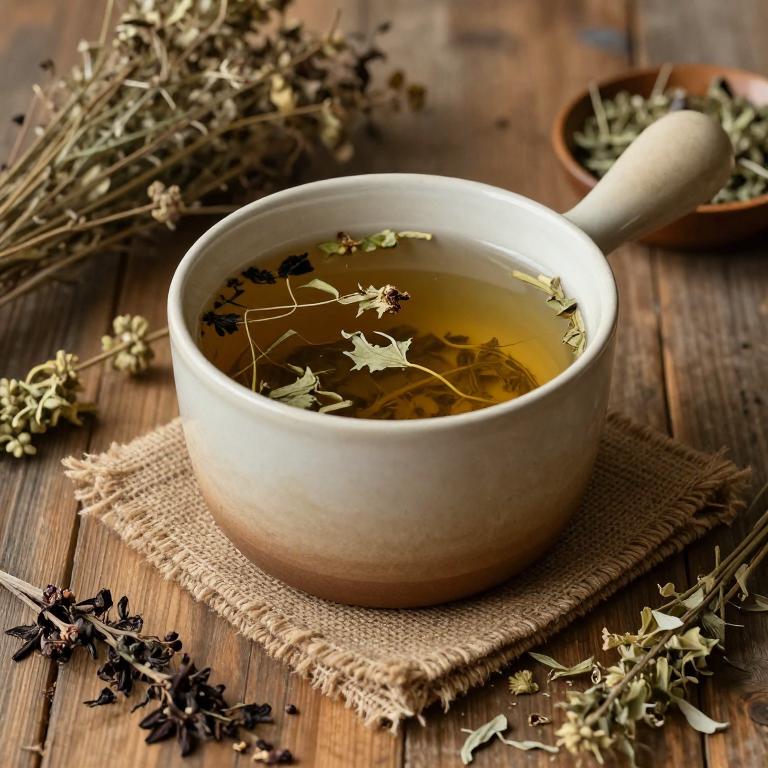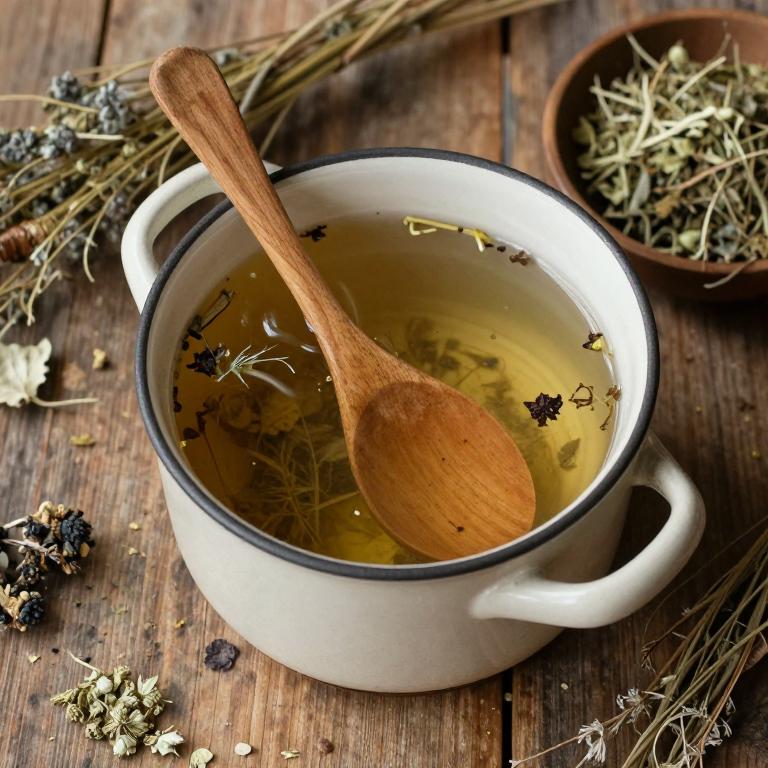10 Best Herbal Decoctions For Headaches

Herbal decoctions have been traditionally used to alleviate headaches by leveraging the therapeutic properties of various plant-based ingredients.
Common herbs such as peppermint, ginger, and willow bark are often included in these decoctions due to their natural analgesic and anti-inflammatory effects. To prepare a herbal decoction, the selected herbs are simmered in water for an extended period to extract their active compounds. This method allows for the gentle release of beneficial compounds that can help reduce tension and inflammation associated with headaches.
While herbal decoctions can be a soothing and natural remedy, it is advisable to consult a healthcare professional before use, especially for persistent or severe headaches.
Table of Contents
- 1. Rosemary (Rosmarinus officinalis)
- 2. Chaste tree (Vitex agnus-castus)
- 3. Ginkgo (Ginkgo biloba)
- 4. Peppermint (Mentha piperita)
- 5. Salvia (Salvia officinalis)
- 6. Stinging nettle (Urtica dioica)
- 7. Black pepper (Piper nigrum)
- 8. Valerian (Valeriana officinalis)
- 9. Ceylon cinnamon (Cinnamomum verum)
- 10. St. john's wort (Hypericum perforatum)
1. Rosemary (Rosmarinus officinalis)

Rosmarinus officinalis, commonly known as rosemary, has been traditionally used for its aromatic and medicinal properties, including its potential to alleviate headaches.
Herbal decoctions made from rosemary leaves are believed to improve circulation and reduce tension, making them a popular remedy for migraines and tension headaches. The active compounds in rosemary, such as rosmarinic acid and cineole, may help reduce inflammation and relax blood vessels, thereby easing headache symptoms. To prepare a decoction, fresh or dried rosemary leaves are simmered in water for several minutes, and the resulting infusion is consumed slowly.
While rosemary decoctions are generally considered safe, individuals with hypertension or epilepsy should consult a healthcare provider before use.
2. Chaste tree (Vitex agnus-castus)

Vitex agnus-castus, commonly known as chasteberry, has been traditionally used in herbal medicine to address hormonal imbalances and associated symptoms, including headaches.
Its herbal decoctions are often prepared by simmering the dried berries in water to extract their active compounds, such as flavonoids and iridoids, which are believed to influence the hypothalamus and pituitary gland. Some studies suggest that vitex may help regulate menstrual cycles and reduce stress-related headaches in women, though more research is needed to confirm its efficacy. While generally considered safe when used in appropriate doses, it is important to consult a healthcare provider before using vitex, especially for individuals with existing medical conditions or those taking other medications.
Overall, vitex agnus-castus herbal decoctions may offer a natural alternative for managing certain types of headaches, particularly those linked to hormonal fluctuations.
3. Ginkgo (Ginkgo biloba)

Ginkgo biloba, a traditional herbal remedy, has been used for centuries to support cognitive function and improve blood circulation, making it a popular choice for alleviating headaches.
Herbal decoctions of ginkgo biloba typically involve simmering its leaves in water to extract bioactive compounds such as flavonoids and terpenes, which are believed to enhance vascular health and reduce inflammation. These decoctions are often prepared at home or by herbalists and consumed as tea or tinctures to promote mental clarity and relieve tension headaches. While some studies suggest ginkgo biloba may help with certain types of headaches, more research is needed to confirm its efficacy and safety.
As with any herbal treatment, it is advisable to consult a healthcare professional before using ginkgo biloba, especially for individuals with existing medical conditions or those taking other medications.
4. Peppermint (Mentha piperita)

Mentha piperita, commonly known as peppermint, has been traditionally used in herbal medicine for its soothing effects on headaches.
Peppermint herbal decoctions are prepared by steeping the dried leaves in hot water, creating a potent and aromatic tea. The active compounds in peppermint, such as menthol and menthone, are believed to help alleviate tension headaches by relaxing muscle tension and improving blood flow. Studies suggest that the cooling effect of menthol may provide temporary relief from headache pain by stimulating sensory receptors in the skin and mucous membranes.
While peppermint decoctions are generally safe for most people, they should be used with caution by those with certain medical conditions or allergies.
5. Salvia (Salvia officinalis)

Salvia officinalis, commonly known as sage, has been traditionally used in herbal medicine for its potential to alleviate headaches.
Herbal decoctions made from dried sage leaves are prepared by simmering the plant material in water, allowing the active compounds to infuse into the liquid. These decoctions are believed to work by reducing inflammation and easing muscle tension, which are common contributors to headache pain. The essential oils in sage, such as thujone and camphor, may also play a role in its analgesic properties.
While some studies suggest that sage may have a calming effect on the nervous system, it is important to consult a healthcare professional before using sage decoctions, especially for chronic or severe headaches.
6. Stinging nettle (Urtica dioica)

Urtica dioica, commonly known as stinging nettle, has been traditionally used in herbal medicine for its potential therapeutic properties.
A decoction made from the roots of Urtica dioica is often prepared by simmering the dried root in water for an extended period to extract its active compounds. This herbal decoction is believed to help alleviate headaches by reducing inflammation and improving circulation. Some studies suggest that the plant contains compounds such as flavonoids and minerals that may contribute to its analgesic effects.
While it is generally considered safe when used in moderation, individuals should consult with a healthcare professional before using stinging nettle decoctions, especially if they have existing health conditions or are taking medications.
7. Black pepper (Piper nigrum)

Piper nigrum, commonly known as black pepper, has been traditionally used in herbal medicine for its potential therapeutic effects, including the relief of headaches.
The active compound, piperine, is believed to enhance the absorption of other nutrients and may have anti-inflammatory and analgesic properties that could help reduce headache symptoms. Herbal decoctions made from black pepper are often prepared by simmering the dried berries in water, allowing the essential oils and compounds to be extracted. These decoctions are typically consumed as a tea or added to other herbal formulations to enhance their efficacy.
While anecdotal evidence supports its use for headaches, further scientific research is needed to fully understand its mechanisms and effectiveness in modern medical contexts.
8. Valerian (Valeriana officinalis)

Valeriana officinalis, commonly known as valerian, is a perennial herb that has been traditionally used for its calming and sedative properties.
Herbal decoctions made from valerian root are often prepared by simmering the dried root in water for an extended period to extract its active compounds, such as valerenic acid and essential oils. These decoctions are believed to help alleviate symptoms of headaches, particularly those associated with tension or stress-related migraines. The sedative effects of valerian may help reduce anxiety and muscle tension, which are common contributors to headache pain.
However, while some studies suggest potential benefits, more research is needed to fully understand its efficacy and optimal usage for headache relief.
9. Ceylon cinnamon (Cinnamomum verum)

Cinnamomum verum, commonly known as true cinnamon, has been traditionally used in herbal medicine for its potential therapeutic effects on headaches.
The aromatic essential oils found in cinnamon, particularly cinnamaldehyde, are believed to possess analgesic and anti-inflammatory properties that may help alleviate headache symptoms. When prepared as a herbal decoction, cinnamon can be consumed as a warming tea to soothe tension headaches and improve circulation. This method of preparation involves simmering the bark in water for several minutes to extract its active compounds.
While cinnamon decoctions are generally considered safe, individuals with allergies or certain health conditions should consult a healthcare provider before use.
10. St. john's wort (Hypericum perforatum)

Hypericum perforatum, commonly known as St. John's Wort, has been traditionally used in herbal medicine for its potential therapeutic effects on headaches.
Herbal decoctions of Hypericum perforatum are prepared by simmering the dried plant material in water, allowing the active compounds such as hypericin and hyperforin to be extracted. These compounds are believed to have anti-inflammatory and analgesic properties that may help alleviate headache symptoms. While some studies suggest its efficacy for certain types of headaches, particularly tension headaches, more research is needed to confirm its effectiveness and safety.
As with any herbal remedy, it is important to consult a healthcare professional before use, especially if taking other medications, due to potential interactions.